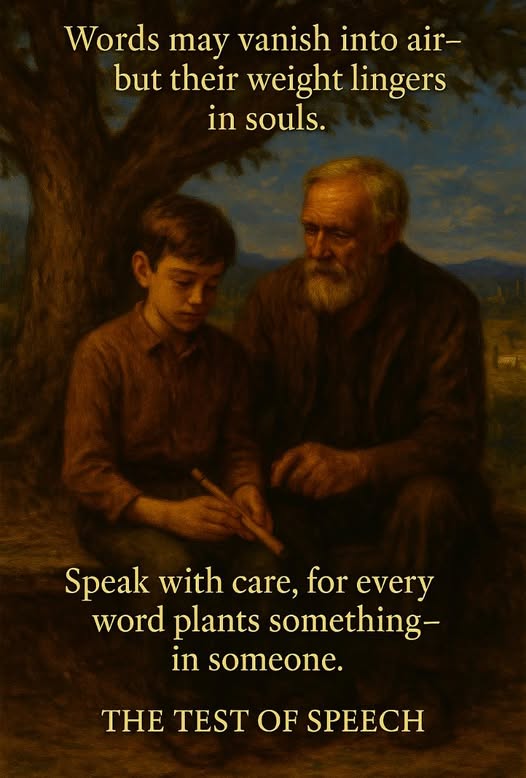
(The Power and Responsibility of Words)
————
The wind whispered through the olive trees as Emil and his grandfather sat under their favorite fig tree, watching the valley stretch endlessly below. A shepherd’s distant call echoed through the air, soft and rhythmic, like a song the mountains had known for centuries.
Emil picked up a twig and traced circles in the dirt.
“Grandpa,” he said quietly, “is it true that words can be more dangerous than swords?”
Grandfather nodded slowly, then leaned over and picked up a small reed flute from his side satchel.
“Blow into this,” he said, handing it to Emil.
Emil tried, but all that came out was a sharp, shrill sound.
“Now listen,” Grandfather said, taking the flute. He adjusted the reed gently, cleared a speck of dust from the opening, and played. A soft, soothing melody flowed out, as if the wind itself had paused to listen.
“The same breath,” Grandfather said, “but different results. Words are like that. The mouth is only the vessel—but the heart decides the tune.”
He paused, watching Emil’s thoughtful gaze.
“You see, Emil, speech is a gift. It can build or break. Heal or harm. Inspire or incite.”
“Is that why some people stay silent?” Emil asked. “Because they’re afraid to say the wrong thing?”
Grandfather smiled gently. “Silence can be wise. But silence out of fear is not wisdom—it is surrender. The real test is knowing when to speak, what to say, and how to say it.”
He pointed to a nearby stream. “See that water? It nourishes the trees, but if unleashed without care, it can drown the roots.”
Then he stood, motioning for Emil to walk with him.
As they strolled, they came across a broken fence where two neighbors had argued weeks earlier. Grandfather stopped and picked up a weathered sign that had fallen in the dust. It read: “Private—Keep Out.”
He turned to Emil. “Words like this were once shouted between the neighbors. Words laced with pride and anger. They haven’t spoken since.”
Emil looked around. The soil beyond the fence was dry, untended.
“They stopped tending the land together,” Grandfather said, “and now both their fields suffer.”
They kept walking until they reached a small grove where children were playing. A girl had tripped and fallen. One boy mocked her, laughing loudly. Another knelt beside her and said something Emil couldn’t hear—but the girl smiled, stood up, and joined the game again.
Grandfather leaned down. “Did you see that? One boy used words to wound. Another used them to heal. Both had the power—but only one chose responsibility.”
Back under the fig tree, Emil whispered, “So our words carry weight we can’t always see.”
“Yes,” Grandfather said. “Words live long after the moment. They echo in minds, lodge in hearts, shape how people see themselves—and how they see the world.”
He paused, then added, “In fact, the angels assigned to every person don’t record our thoughts—but our words and actions. That alone tells you their importance.”
Emil looked down at the dirt where he had once traced aimless circles. He now drew a single line—deliberate and straight.
“I want my words to build, not break.”
Grandfather placed a hand on his shoulder. “Then let every word you speak be like a prayer—truthful, gentle, and just. That, my boy, is how the soul passes the test of speech.”

